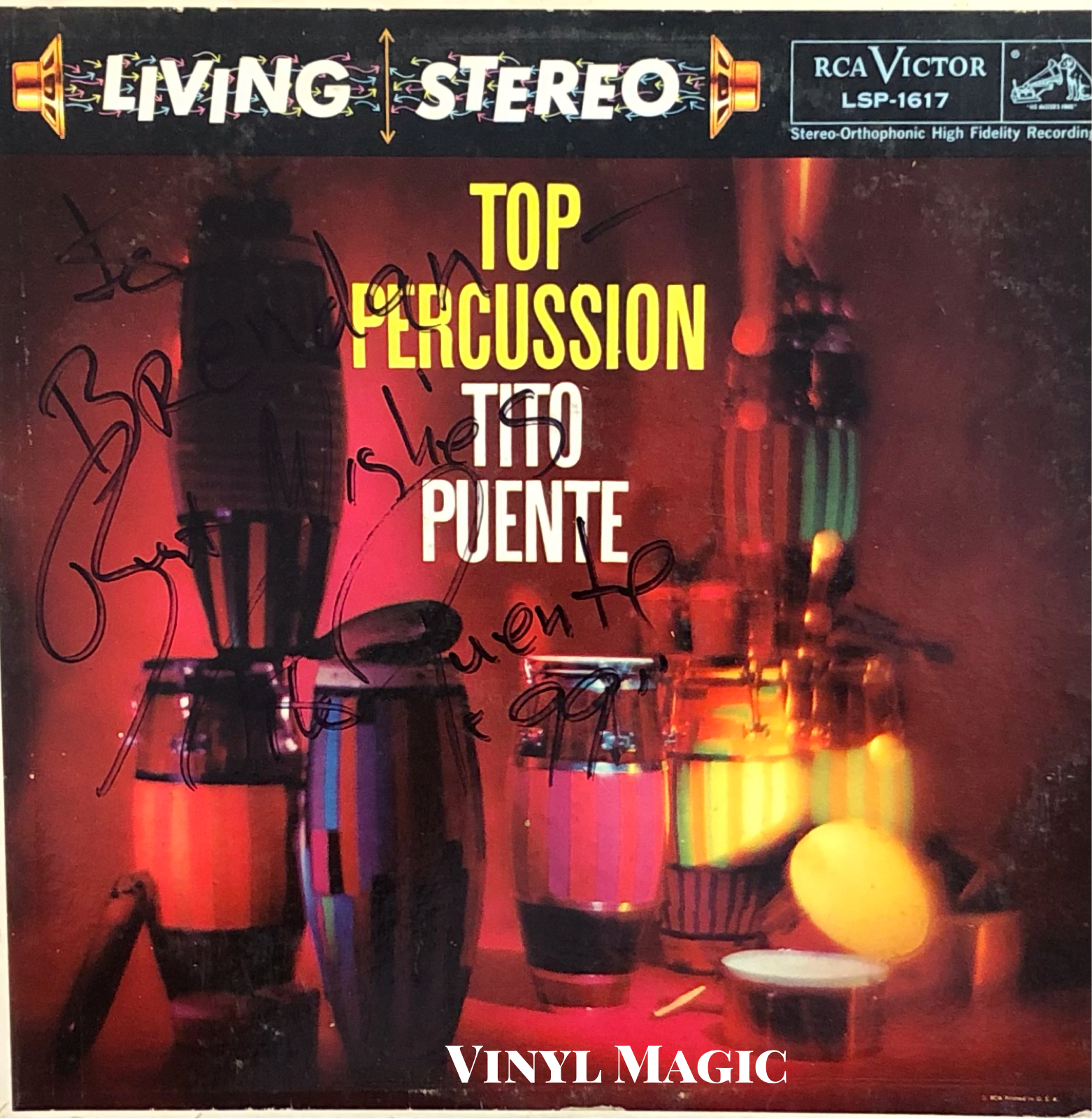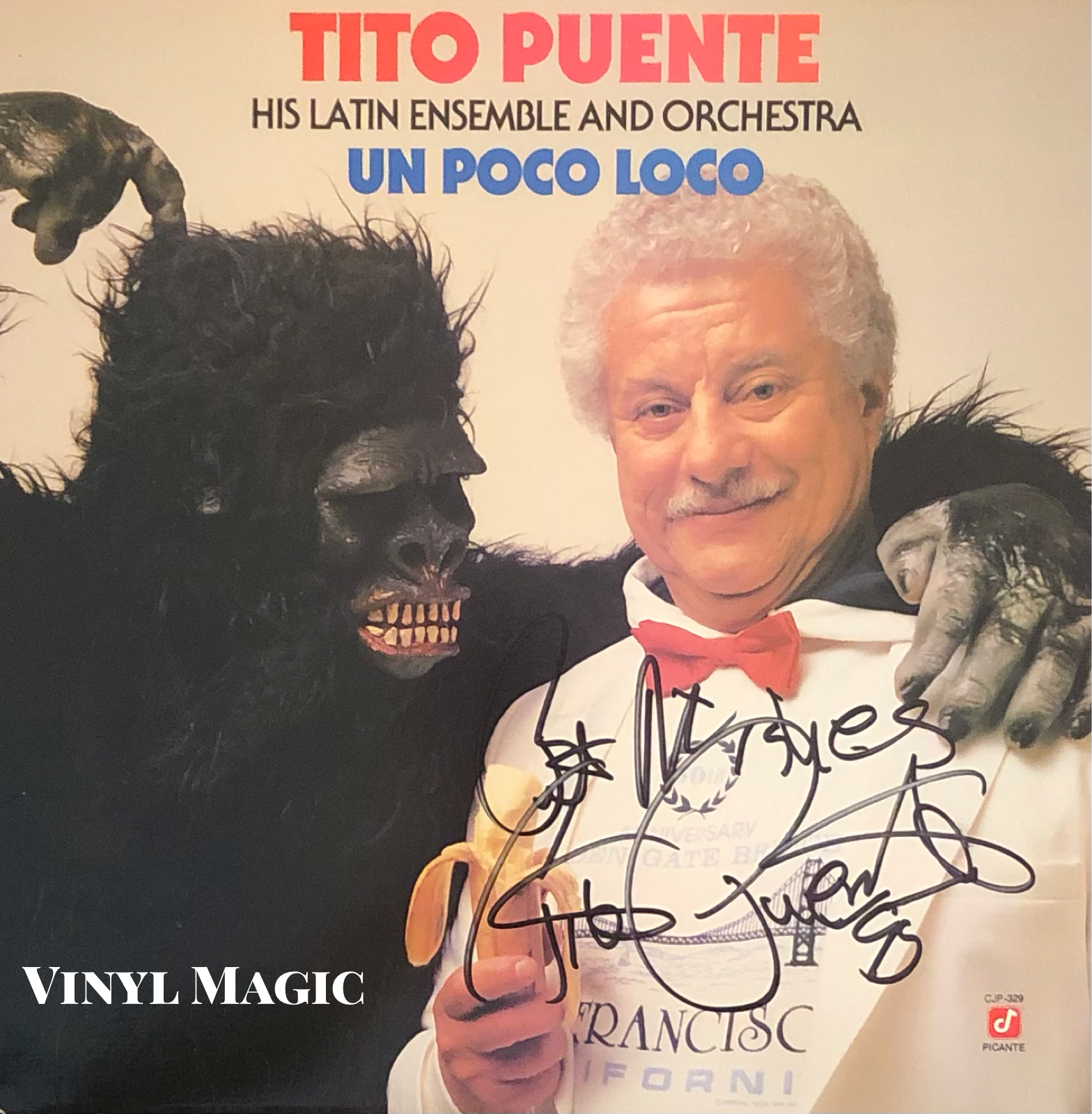Tito Puente, Mona and Me…
Everybody's heard of Santana. Santana! Beautiful Santana! He put our music, Latin rock, around the world, man! And I'd like to thank him publicly 'cause he recorded a tune and he gave me credit as the composer of the tune. So, since that day... all we play... is Santana music!
Tito Puente on Santana covering his song "Oye Como Va”
Cuban Carnival (1956) signed by Tito
Dance Mania (1957) signed by Tito
Dance Mania (1958 import) signed by Tito
The only salsa I know is sold in a bottle called ketchup. I play Cuban music.
Tito Puente
Ernesto Antonio "Tito" Puente spent much of his childhood in Spanish Harlem in New York City where he became immersed in the Latin rhythms of the day. After being drafted in 1942, Tito served in the US Navy for three years, and he saw nine battles on the escort carrier USS Santee. After being discharged with a Presidential Unit Citation, Tito formally studied music theory, orchestration and conducting (via the GI Bill) at the Julliard School of Music in New York.
In 1947, Tito joined Machito's orchestra as a drummer, then switched to the timbales. Machito's orchestra was the first to incorporate Afro-Cuban rhythms and introduced the triple play of conga, bongos and timbales as the standard Latin percussion. In the early 1950s, Tito started his own orchestra and he helped foment the mambo and Latin dance craze. Shows at the Palladium were legendary and introduced the "cha cha cha", mambo and other dances to an enthusiastic and wider audience than the uptown Latin clubs. Tito became "El Rey del Timbal" or just "El Rey."
Mamborama (1955) signed by Tito
Dancing Under Latin Skies (1959) signed by Tito
Dance The Cha Cha Cha (1959) signed by Tito
Let’s Cha Cha Cha With Puente (1959) signed by Tito
Tito Puente released over one-hundred albums in his brilliant career and is probably the most well known and beloved star in Latin or Latin jazz history. He won five Grammy awards and appeared on The Cosby Show (when it was a mark of distinction!) and The Simpsons (still a hallmark of excellence and cultural relevance!). He also helped the careers of many important Latin musicians: Ray Barretto, Willie Bobo, and Mongo Santamaria played in Tito's band and had considerable success as solo artists.
Tito's music was exposed to the Woodstock generation when Santana recorded "Oye Como Va" (written in 1963) on Santana's breakthrough Abraxas (1970) album. "Oye Como Va" has since become Tito's most well known composition. At shows thereafter, Tito gratefully acknowledged the great guitar master's exposure as a wonderful boost to his career. And the songwriting royalties didn't hurt either!
Bossa Nova By Puente (1962) signed by Tito
Mucho Cha Cha (1959) signed by Tito
I saw Tito and his orchestra dozens of times over the years and his music was so powerful, joyous and uplifting. Most jazz and rock bands have the percussion set up in the back. Not Tito. Timbales, conga, bongo all in front. The spotlight and focus was on Tito and he reveled in it. He was a showman's showman. His percussion was the propulsive locomotive of the entire band. As Count Basie said of his big band, "we have a good night if our drummer (Jo Jones) has a good night,” and every night with Tito was a great night. The horn section anchored by Mario Rivera on tenor saxophone and Ray Vega on trumpet was placed in back of the percussion, and what a joyful noise those ten or twelve collective pieces made!
Top Percussion (1957) signed by Tito
One day when I was digging through crates at a record store, I came across Music For Romancing (1955), a mambo compilation with a very alluring model reclining on her back, two wine glasses nearby, a lit cigarette burning in an ashtray full of stubs. The cigarette wasn't the only thing smoldering, she was sultry and sexy. The record was on Tico, a label started by George Goldner in 1948 which became home to early recordings in the 1950s by Tito Puente, Tito Rodriguez and Machito - The Mambo Kings. I scanned the back cover, there was no mention of any artists. I looked again at the front cover. Easy call. I buy. I slipped the record into my stack and I went to the checkout to purchase it.
Music For Romancing (1955) signed by Tito
Many years later, I saw Tito for the last time at The Blue Note in NYC in early 2000. He was in great form and he had his superlative musicians with him. I knocked on the dressing room door, and Tito invited me in. He was with a friend. I showed Tito the album Music For Romancing. I asked him, ‘Who’s the babe on the cover?’ Tito was excited. He grabbed the album from me and showed it to his friend who was sitting on a couch five feet away. Tito unleashed a torrent of Spanish incomprehensible to me, save one word: "tits." My ears perked. Then he turned to me. Solemnly, he said, "You know who that babe is? I can tell you exactly who that babe is. Her name was Mona. She had gorgeous tits. Look at her tits. She was the wife of the president of my record label (Tico). Look how beautiful her tits are." I took the bait. There was something wonderfully alliterative (and naughty) in talking tits with Tito. I said, ‘Tito, I love tits. My wife has great tits. Would you mind signing Mona's tits?’ "Yes, I'd be delighted to sign her tits" came the quick reply. "Best wishes, Tito Puente '00" was lovingly scrawled on possibly my favorite record cover.
In real life, Mona was Ramona Goldner, the Puerto Rican born wife of Tico record label president and founder George Goldner. Mona was so beautiful that Tito Rodriguez, fellow Mambo King, wrote "Mambo Mona" or "Mama Guela" as a tribute to her ravishing looks, a song which has become a Latin jazz standard. And George Goldner's interest in Latin music started with his wife's introduction to those wonderful, sensuous rhythms and sounds. While Mona may not have been the face that launched a thousand ships, she certainly moved and inspired thousands of hips!
Thanks El Rey for your joyous and life affirming music, and your discerning eye for talent on and off stage.
Homenage a Beny More (1978) signed by Tito
Cuba y Puerto Rico Son (1966) signed by Tito
El Rey y Yo (1967) signed by Tito
CE’ Magnifique (1981) signed by Tito
Un Poco Loco (1987) signed by Tito
Latina Familia (1989) signed by Tito, Sheila E.
On Broadway (1983) signed by Tito

















